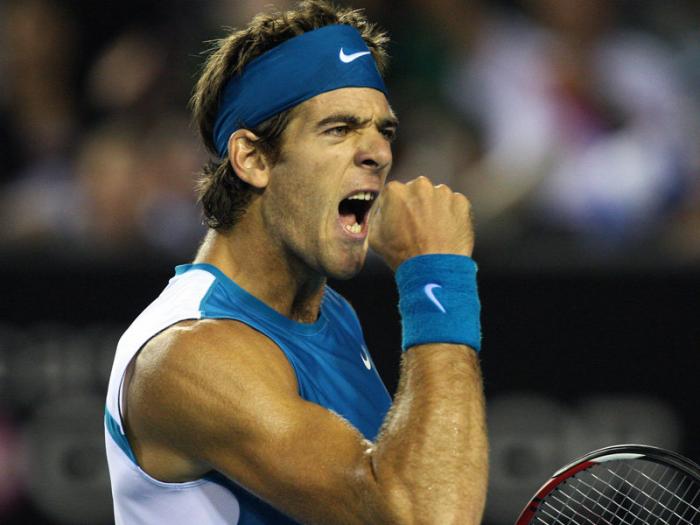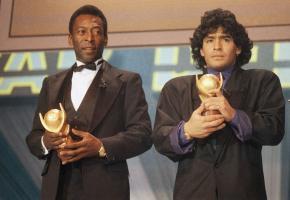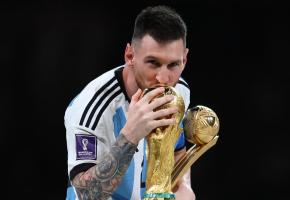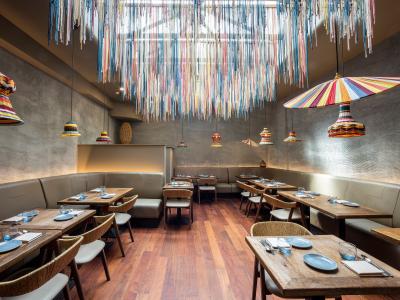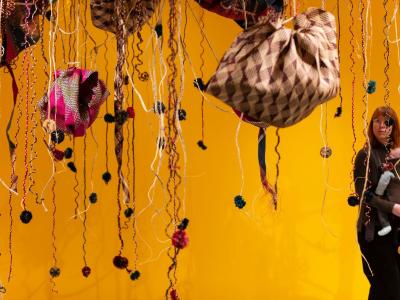It’s impossible not to notice the shy man with the rackets sauntering into the players lounge. They don’t call Juan Martin Del Potro the 'Tower of Tandil' for nothing. Yet, instead of the gangly awkwardness that often comes with being a giant, there is a subtlety and grace to the Argentine’s height,
When I met 'Delpo,' the youngest ever winner of the US Open, he was only just recovering from an illness which put him out of the French Open, and about to play a practice match before Wimbledon.
“I’ve been going through a few rough months. I had an allergic virus that affected my respiratory system. It started with a very high fever, I couldn’t train or play at all for about 20 days, I had to rest in Buenos Aires and Tandíl with my family. When I started to play I got tired really quickly. It was really difficult, I just wasn’t in a condition to play a tournament like Roland Garros where you have to 100 % at every level.”
Getting ill or injured is every top sportsman’s nightmare and has ruined many a sports star’s career and Delpo has had his fair share of injuries, mainly to the wrist, on account of an extraordinairy forehand - probably the best ever in the game for a player his height - which he slaps down to annihiliate opponents. And his body has paid the price for this menacing weapon.
“I’m a lot better, it's a process that takes a time though. Queens was really the first time I played. I played three matches and some doubles, which was helpful to get back into form, and I am training a lot. Now at Wimbledon, I’m not sure I’m 100 per cent but the important thing is that I’m better and improving.”
How is it to come back on grass, would you prefer a different surface to have to come back on?
“You know my favourite surface is hard court, but I like grass. Some think that I’m at a disadvantage being tall being but for a player that has a big serve like me and who hits the ball hard, I think grass helps and that was proved last year.”
Never mind his view of grass, I’m more curious about what the Argentine thinks about the strange English tennis environment, exemplified by this pre-Wimbledon exhibition tournament, The Boodles, set on a spectacular country estate, reminding me of how elitist the sport is in the UK.
“It’s nice, people are respectful and the fans at Queens and Wimbledon are generally people who know about tennis. The whole formal thing, with rules and obligatory white is something different for us Latin Americans. The grass courts are absolutely perfect, they are immaculate, and make you want to play, so for once a year it’s kind of special.”
I have the impression, however, as the Argentine giant glides through the Hooray Henriettas tottering in stilettos, champagne bottles in hand, towards the court that none of this, nor the champagne corks regularly popping and flying in the crowd as he plays, registers on Del Potro’s radar.
It couldn’t be further from the sleepy town of Tandil where he grew up. Delpo (as he is referred to) probably doesn’t even realise how his home town of 100,000, which has astonishingly produced more top hundred male tennis players than the entire British Isles in the last ten years, is the envy of British Tennis.
“For me, its just about getting your head down and fighting, moving forward, step by step, point by point, without thinking about the future too much or the next match or next title, and just enjoy the fact that you’re competing with the best players in the world.”
It’s about staying focused on what needs to be done to get the prize, rather than the prize itself, says Delpo. This might be easy to say, when you are one of the few who HAVE got the elusive grand slam title that hundreds of professionals only dream of, and he got it when he was only 21 years of age.
What is noticeable about how Del Potro describes his tennis development is how unforced and unpressured its been.
“As a kid I preferred football and hanging out with friends. One day someone lent me a racket I started hitting on the wall in the club where I played football. The next week my mum took me to a class. And I liked it but it wasn’t like I was hooked or crazy about it. I played football every day and tennis once a week. And it was like that for several years. Until the tennis coach in the club said that I had the right elements and that I should try to play a bit more. So I started playing three times a week and then eventually every day and starting playing tournaments, but not till I was about 12. I point to the fact that here in the UK that is considered quite late. Ultra-ambitious parents are having their kids play tournaments at six or seven.
“Yes, I know, but in Argentina it's a bit different. And 10 years ago even more so. I had a normal childhood. In fact, my parents were much more concerned with me doing my school work than playing sport. Tennis was like a hobby.”
Well Argentina, and specifically Tandil, must be doing something right, I suggest. It has more players in the Wimbledon draw than the UK. England’s obsession with English players winning Wimbledon has certainly never helped them win it (lets not forget Murray is Scottish). And this obsession with winning rather than playing is often reflected on the junior tennis scene here.
By contrast, Delpos says: “The only one who really pushed me was the coach, Marcelo Gomez.”
This is the coach who also took other players from Tandil such as Juan Monaco, Mariana Zabaleta, Maximo Gonzalez, to the top 100, unheard of for a town that size.
“What does he have that is so special?” I ask
“Marcelo is just very good with the little kids, teaching them technique, teaching them how to hit the ball. He simply teaches the basics very well. He is also very coherent and responsible. But more than anything he knows how to manage children, their behaviour and he knows how to encourage them. He cares and is very dedicated.”
Indeed, in Argentina children are very much at the centre of society, as is tennis. Far from an elite sport, tennis is part of the broader culture. Sports clubs are a popular phenomenon; they are not expensive and don’t require membership. Clubs will often let children join lessons for free, in order to encourage them, whether in small towns or big cities. It is a normal sport, with its roots in the community and this perhaps counts more in the end than the government pouring money into the sport, as it does in the UK. Ironically, Mrs Murray, Andy’s mother, herself is openly campaigning to bring tennis from the elite to the community.
I suggest that he and her have a chat about it: “How are you two getting along these days?” I ask. Del Potro laughs. He knows I am referring to an on-court dispute four years ago in which Del Potro angered Murray by criticising his mother.
“You know, we were very young. I have known Andy and his mother since we were kids. Growing up together you are always bound to have some ‘moments’ on the court. But I respect both Andy and his mother a lot and I have a very good relationship with her now don’t worry.”
Indeed, it would be difficult to bear a grudge against such a gentle giant. How much Tandil, or Delpo’s own humble beginnings have to do with his healthy approach is difficult to gage. Delpo admits to being “a very focused person, in everything I do.”
What is clearer, however, is that that if Del Potro had been brought up in the UK, he probably wouldn’t have had access to tennis in the first place, and even less of meeting an outstanding coach, who are few and far between in the UK.
“The most difficult period in my whole career was the money. I never had any problems on the court. Mentally or tennis wise I had the right conditions. But the money situation was very difficult. My parents didn’t have much, and we didn’t get any help, it was a real struggle to travel and pay for equipment, training the tournaments. They made big sacrafices.”
What strikes me is the uncomplicated approach Del Potro has towards tennis, and this I am sure comes form his background.
“I separate tennis from my personal life. Tennis is my day job. It's a job that I do well and I like, and I want to continue to do at a high level. I don’t think about being number one, just doing the best I can. I like my life as a tennis player, I like playing in front of a whole load of people, being recognised for what I do. I get access to a lot of things, people, idols of mine because of what I do. But I know this life will end and I look forward to going back to Tandil, to my family and life there. I’m very attached to it and my friends and I miss them lot. Argentina is a very nice place, one that's is easy to miss. That is where I want to go back to.”
A week after this interview, Del Protro reached the Wimbledon semi-final in 2013 and went on to win another Olympic medal.


